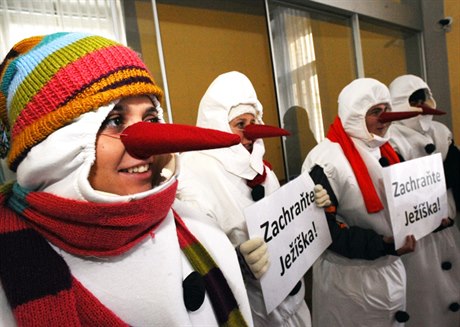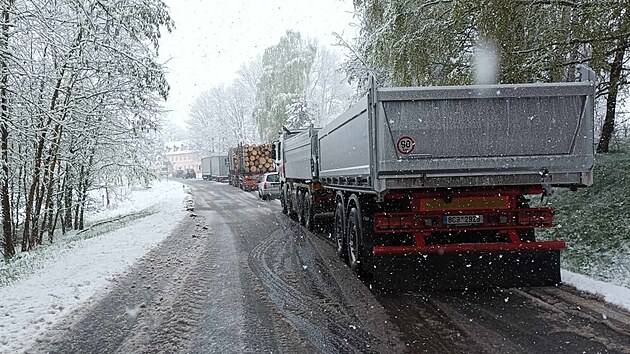Since the reintroduction of capitalism at the start of the 1990s, the Western figure of Santa Claus has become highly visible in the Czech Republic at this time of year, frequently appearing in store displays, advertisements, and seasonal TV schedules. However, some Czechs are now saying a firm “no thanks” to this particular import from the Anglo-Saxon world – and calling for the preservation of their nation’s own rich Christmas traditions.
A few years ago, Tomáš Zdechovský’s kindergarten-age son asked him whether he would get twice as many toys if he sent wish-lists to both Santa and the traditional bearer of gifts to Czech children, Ježíšek (the Baby Jesus). “It annoyed me so much that I said to myself that something had to be done,” Zdechovský told Czech Position.
He launched a petition campaign “against the Americanization of Czech Christmas” titled Save Ježíšek, which is currently being held for the fourth time. As well as collecting online signatures, this year Zdechovský and other members of his group have been holding demonstrations-cum-petition drives — clad in snowman outfits — on the squares of a number of Moravian and Bohemian towns.
On Sunday (Dec. 18), they are planning to present the petition to the Czech prime minister, Petr Nečas, at the Office of the Government in the capital. Zdechovský, who is a media consultant and the former editor-in-chief of the religious website Christnet.cz, says he has reason to believe that the premier is “favorably disposed” towards the campaign.
Save Ježíšek is not the only initiative of its kind. In 2006, the Creative Copywriters Club (CCC), a group of advertising professionals, set up a website named Anti Santa as a forum for opposition to the previously alien figure. The site – which features the slogan “Santa go home!” — has a chat room and a “fujgalerie” (yuck gallery) of photographs of St. Nick in Czech settings.
Enough globalization already
Anti Santa’s David König tells a similar tale to Zdechovský. He was moved to act after reading a book to his children that attached the name Ježíšek to a “jolly, bearded, overweight old guy in a red-and-white suit.”
“The problem is that kids grow up with this and then it becomes normal to them, and the traditions that have been here forever will die out,” König told Czech Position. “I’m not against Father Christmas. I respect the fact that it exists in America or the UK, but it doesn’t belong here. We don’t need to be globalized in everything.”
König insists the group doesn’t take the whole thing very seriously, and one can only assume that an unlikely comparison made by a CCC colleague on the Anti Santa website is an attempt at black humor. “Santa’s arrival in the Czech Republic has a parallel with that of Hitler,” writes Petr Vlasák. ‘After decades of Communism, all traditional values here had been turned upside down, like in Germany after WWI and the financial crisis.’
“After decades of Communism, all traditional values here had been turned upside down, like in Germany after WWI and the financial crisis.” This paved the way for the “strong leader” Santa, who promised the masses he would provide them with a beautiful Christmas from then on, according to Vlasák.
Santa Claus is not the first Yuletide invader seen in this part of the world. In the early 1950s, the Czechoslovak Communist Party, attempting to please its Moscow masters, made great efforts to popularize the Russian equivalent, Děda Mraz or Mrazík (Grandfather Frost, Ded Moroz in Russian), a traditional Slavic gift bearer.
While the regularly broadcast 1964 Russian film “Mrazík” (Jack Frost, Morozko) is today regarded by many Czechs as something of a kitsch classic, König says at the time the state-imposed Děda Mraz never caught on in the slightest with the population. A 1952 speech by then prime minister Antonín Zápotocký in which he made the claim that “Ježíšek grew up, got old, grew a beard, and became Děda Mraz” was greeted with widespread derision.
© YouTube PM Antonín Zápotocký, who later became president of Communist Czechoslovakia, did not convince many with an address claiming Ježíšek had turned into Děda Mraz.
While the figure is of course centuries old, Zdechovský says one reason that he and many other Czechs have an antipathy to Santa Claus is because his now-standard appearance (red suit and hat lined with white fur, sporting a white beard) has a commercial provenance; it was created by US soft drinks giant Coca-Cola for an advertising campaign in 1931.
König, who works in the industry, says Father Christmas has become such a common sight partly because multinational companies are unwilling to tailor their TV ads to small markets like the Czech Republic. What’s more, the figure of Ježíšek – which, if at all, is imagined as an angelic baby — cannot be so easily exploited commercially.
“It’s hard to depict something that everybody imagines slightly differently,” he says. “For me, that’s part of the magic of Christmas, that children never get to see Ježíšek.”
Escape Claus?
There are only a handful of films in which Ježíšek appears, such as “Past na Ježíška” (Trap for Ježíšek) and Anděl Páně (The Angel of the Lord), both from the mid 2000s. While Czech TV channels traditionally show classic fairytale movies on the evening of Dec. 24, when the festival is marked here, American Christmas fare is frequently aired at off-peak times during the holiday season. This year’s schedules include “Fred Claus” (about Santa’s “bitter older brother”), “Home Alone” and “The Santa Clause 3: The Escape Clause.” The ‘traditional Czech department store’ Kotva won’t sell any products bearing Santa’s image this holiday season.
One place that Mr. Claus won’t be seen this year is the Kotva department store in downtown Prague. Keen to step up its activities, Anti Santa has joined forces with the store for an ad campaign centered around billboards depicting a sharp-suited cartoon Czech lion (the national symbol) seated above a Father Christmas in the form of a bearskin rug.
Kotva, whose marketing emphasizes that it is a “traditional Czech department store,” has pledged not to sell any products bearing the image of Santa this holiday season. The local TV station Metropol is also taking part in the campaign.
© YouTube Ice hockey star Jaromír Jágr spreads Christmas cheer, Western style, in this TV advert for the betting company Sazka.
While Yuletide will be behind us very soon, Anti Santa will not rest until the New Year. In January, it plans to present its annual Zarach (meaning house arrest, or a bar on doing something) award to the Czech company that it feels has most failed to understand what makes a traditional Czech Christmas.
König says no final decision has been made, but the betting giant Sazka is a “hot candidate” for its current TV ad featuring ice hockey star Jaromír Jágr in a Santa suit.




